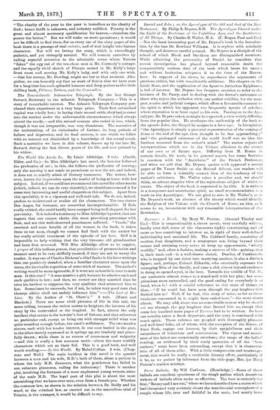Daniel and John ; or, the Apocalypse of the Old
and that of the New Testament. By Philip S. Deprez, B.D. The Apocalypse Viewed under the Light of the Doctrines of the Unfolding Ages, and the Restitution of All Things. By Charles B. Waller, M.A. (C. Kegan Paul and Co.) —Not the least interesting part of Mr. Deprcz's book is the Introduc- tion, by the late Dr. Rowland Williams. It is replete with scholarly thought, and deserves careful perusal. Mr. Deproz is a disciple of the school of which Bleck and Davidson are distinguished members. While admitting the personality of Daniel, he considers that recent investigation has placed beyond reasonable doubt the comparatively modern date of the book which bears his name ; and without hesitation relegates it to the time of the Macca- bees. In support of his views, he reproduces the arguments of previous critics, but with considerable additions. His chapter on the Little Horn, and the application of the figure to Antiochus Epiphanes, is full of interest. Mr. Deprez has frequent occasion to refer to the lectures of Dr. Pusey, and in dealing with the doctor's strictures on those who reject the orthodox view, our author exhibits, for the most part, a calm and judicial temper, which offers a favourable contrast to the spirit in which his opponent too frequently speaks of scholars whose reputation is at least equal to his own. Passing on to the Apo- calypse, Mr. Deprez takes, as might be expected, a view widely differing from the popular idea. He attributes the authorship of the book to the apostle John, the Gospel be assigns to a later age. In his opinion, "the Apocalypse is simply a pictorial representation of the coming of Jesus at the end of the age, then thought to be fast approaching ;" and "the prolonged existence of the world itself we's an idea the furthest removed from the writer's mind." The author rejects all interpretations which see in the Visions allusions to the events of our own or of future ages. Differing from M. Renan in certain details, his work, in its general aspect, has many features in common with the " Antichrist " of the French Professor; and when we add that Mr. Deprez quotes with approval a recent paper of Dr. Vance Smith on the Second Advent, our readers will be able to form a tolerably correct idea of the tendency of the author's criticisms. Mr. Waller takes a peculiar and, we should think, an almost singular view of the mysterious subject of which lie treats. The object of the book is expressed in its title. It is written in a temperate and unsectarian spirit, no small recommendation to a work on the Apocalypse. We are glad to note in Mr. Waller's, as in Mr. Deprez's work, an absence of the theory which would identify the Babylon of the Visions with the Church of Rome, an idea, as it seems to us, inconsistent with any reasonable interpretation of the Revelation.


































 Previous page
Previous page